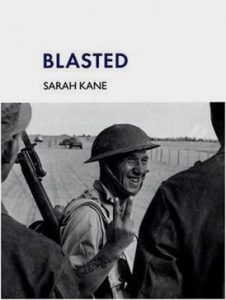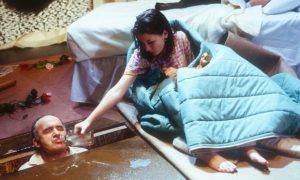A Room for All
Sarah Kane’s Blasted (1995) and Human Dignity
by Elifsu Gürtaş

The public has always had to pay the price for the power wars conducted between the authorities. While the people placed in the lower level in the social hierarchy have been the worst affected, the hawkish officials have spent their time enjoying the wealth and the reputation emerging from money providing wars. An English play writer Sarah Kane wrote the anti-war play Blasted to demonstrate her reaction against the Bosnian War between 1992 and 1995. The plot revolves around the violent relationship between Ian, Cate and the soldier in an expensive hotel room. A racist and homophobic journalist Ian invites Cate to the room and sexually assaults her in one of her epileptic fits. After a mortar bomb, the room transforms into a war zone revealing a rape scene between the soldier and Ian. The soldier commits suicide by having shot himself in the head and Cate watches Ian’s suffering under the exploding wall of the hotel room.
The play intentionally uses only one setting to reveal the fact that serious incidents such as rape can be experienced by anyone regardless of their social rank in wartime which turns the world into a place without human dignity. Sarah Kane demonstrates the rape of Ian as a method of justice for Cate since she makes him live under a wall after the explosion despite Ian’s cries for help. While the audience observes Ian’s disrespecting Cate’s free will and body in the first scene, it is later seen that the room has become a formidable hell for Ian’s violating acts. In addition to his behavioural violations, Ian also verbally underestimates the existence of Cate and the soldier as members of society. Ian mocks Cate’s inefficiencies as a woman for working life and undervalues the difficulties that the soldier has faced during his life. He even mentions that the soldier’s life is not worth being mentioned in the newspaper since the stories of authorized people make the newspaper earn more money.
Despite Ian’s insulting judgement of human value, Sarah Kane presents her notion that every person is valuable while giving importance to narrate the stories of Cate and the soldier. While the audience does not learn anything about Ian’s past, it is known that Cate has a disabled brother and a caring mother, and the soldier has gone to school and loved a girl murdered by the violent soldiers. The expensive hotel room transforms into the representation of an unjust world suffered by Cate and the soldier. In an apocalyptic environment caused by war, the value of a person is measured by one’s relationship with authorized people. The play mocks the man in charge by making Ian a victim, similar to Cate whom he victimized at the beginning of the play. As the play criticizes, the value of human cannot be measured by their rank in society and human dignity cannot be underestimated because of their social role. Everyone’s story matters.

